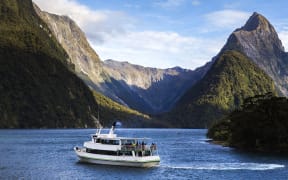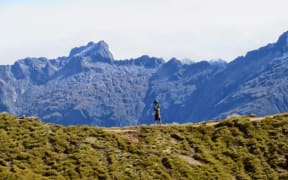Proposed changes to conservation law aimed to make them more user friendly are opening up for public feedback.

Minister of Conservation Kiri Allan describes the current laws as ad hoc. Photo: RNZ / Samuel Rillstone
They are part of a conservation law reform roadmap first announced in December last year.
The proposals were focused on streamlining the processes for concessions and management planning for national parks and conservation land.
Minister of Conservation Kiri Allan said the current laws were ad hoc, not fit for purpose, frustrating, time-consuming, and some dated back 70 years.
"Management strategies and plans are key tools which help manage natural and historic resources by providing guidance on what can and cannot be done in our national parks and conservation areas," Allan said.
The proposed Conservation Management and Processes Bill was seeking to make the rules more workable, flexible and better suited to a modern environment through targeted amendments and changes, she said.
The proposals included making it easier to undergo partial reviews, ensuring planning documents were online, reducing the administration where possible, making concessions for pre-approved activities available, and giving the conservation minister the power to create legislation that allow an activity without the need for a concession.
The proposals focus on three key areas:
- The ability to develop and review statutory management strategies and plans
- The ability to process and manage a range of activities to be undertaken on public conservation lands and waters through the concessions process
- The ability to resolve or clarify miscellaneous minor or technical legislative amendments
"They are to encourage a faster, more efficient, more engaged, more information driven process that makes things easier, more accessible, and removes some of the barriers, which I think are having adverse and perverse effects on the way that people think and see conservation land."
The Department of Conservation (DOC) manages more than 4600 active concessions and receives roughly 1000 applications a year from tourism operators, researchers, farmers and others.
"However, existing requirements mean that processing applications can be slow and costly, and frustrations are often felt where decisions are delayed, or opportunities are missed," Allan said.
She was pleased to be able to start addressing some of the issues plaguing the national park rules and their review process - which was meant to occur every 10 years or sooner.
In a discussion document on the proposals, DOC estimated that the average cost involved in an approximately three year full review process would be $900,000.
"During any one year, there will be multiple processes underway to develop or review planning documents," the document said.
"However, current resourcing and approaches are unable to keep pace with the demand for full reviews and developing new plans.
"Consequently, few planning document reviews meet the 10-year timeframe, which has created a backlog of documents that need urgent attention."
That was where Allan said the more efficient, less arduous, less expensive targeted partial reviews could help, especially if they removed the pressure for a full review every decade.
"Some of which haven't been reviewed for an excess of 30 years. The practices or what you can do on public conservation land, there isn't the ability for the Department of Conservation to grant concessions where those activities aren't prescribed."
That could include not allowing drones or mountain biking because the rules were implemented before they existed or were mainstream.
"It is likely that many older documents would still require full review at 10 years, but there would be some that only require updating through a partial review (eg those that have been partially reviewed previously), reducing additions to the backlog compared with the status quo and providing assurance that the guidance is largely relevant," the document said.
She intended for the proposed bill to be in use by August next year or within this parliamentary term.
"Part of a wider law reform process to address a number of long standing problems in conservation law, these changes seek to make immediate improvements to better deliver conservation outcomes
"While the proposed bill does not provide options on more comprehensive conservation reform, this interim work is important from a regulatory perspective.
"It allows us to keep our house in order while we work towards long-term reform of the conservation legislation framework."
Other work was underway to improve different parts of conservation law, she said.
'Good for everybody' - Fiordland operator
A tourist operator is welcoming the proposed changes, saying they should help to remove several handbrakes from the rules.
Abel Tasman Aqua Taxi owner Brendan Alborn said: "I think it's overdue, but I couldn't be happier with the approach to hit the highlights rather than go through a fundamental review of absolutely everything, which is going to take several years.
"This really does seem to be a fantastic approach to getting the most needed measures and changes made rather quickly."
Alborn has been frustrated by the current rules for years.
"There are several handbrakes with any progress.
"If this review succeeds in making that a lot more of a dynamic and fluid process like we've grown to expect in the modern world, then it's just going to be good for everybody.
"It's not like it's going to have a detrimental effect on either the conservation or the commercial activity, or New Zealanders' ability to access the conservation areas. It can only be positive."
Plans for commercial mountain biking have been halted under the 2008 rules for the Abel Tasman National Park despite community and business backing.
He hoped that the changes could make it easier for it to be allowed in certain parts of the national park in the winter and shoulder seasons when visitor numbers dwindled.
"Those are the sort of things that hopefully this review will involve and improve."
From what he had read so far, he said there didn't appear to be anything missing and it seemed to address the key concerns.
He was pleased with the timeframe outlined by Allan, saying these types of changes could not be achieved overnight.
Submissions close on 30 June.
The discussion document will be available on the Department of Conservation website.






